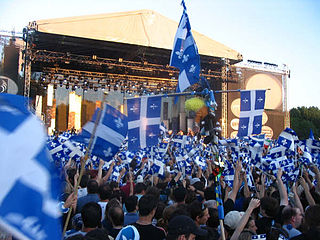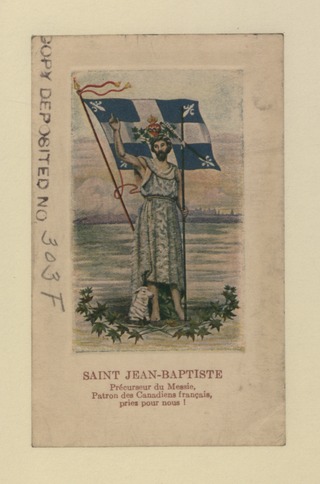Related Research Articles

The Quebec Liberal Party is a provincial political party in Quebec. It has been independent of the federal Liberal Party of Canada since 1955. The QLP has always been associated with the colour red; each of their main opponents in different eras have been generally associated with the colour blue.

Joseph-Napoléon-Henri Bourassa was a French Canadian political leader and publisher. In 1899, Bourassa was outspoken against the British government's request for Canada to send a militia to fight for Britain in the Second Boer War. Prime Minister Sir Wilfrid Laurier's compromise was to send a volunteer force, but the seeds were sown for future conscription protests during the World Wars of the next half-century. Bourassa unsuccessfully challenged the proposal to build warships to help protect the empire. He led the opposition to conscription during World War I and argued that Canada's interests were not at stake. He opposed Catholic bishops who defended military support of Britain and its allies. Bourassa was an ideological father of French-Canadian nationalism. Bourassa was also a defining force in forging French Canada's attitude to the Canadian Confederation of 1867.

The Conscription Crisis of 1917 was a political and military crisis in Canada during World War I. It was mainly caused by disagreement on whether men should be conscripted to fight in the war, but also brought out many issues regarding relations between French Canadians and English Canadians. The vast majority of French Canadians opposed conscription; they felt that they had no particular loyalty to either Britain or France. Led by Henri Bourassa, they felt their only loyalty was to Canada. English Canadians supported the war effort as they felt stronger ties to the British Empire. On January 1, 1918, the Unionist government began to enforce the Military Service Act. The Act caused 404,385 men to be liable for military service, from which 385,510 sought exemption.

The Quebec sovereignty movement is a political movement whose objective is to achieve the independence of Quebec from Canada. Sovereignists suggest that the people of Quebec make use of their right to self-determination – a principle that includes the possibility of choosing between integration with a third state, political association with another state or independence – so that Québécois, collectively and by democratic means, give themselves a sovereign state with its own independent constitution.

Le Devoir is a French-language newspaper published in Montreal and distributed in Quebec and throughout Canada. It was founded by journalist and politician Henri Bourassa in 1910.
The politics of Quebec are centred on a provincial government resembling that of the other Canadian provinces, namely a constitutional monarchy and parliamentary democracy. The capital of Quebec is Quebec City, where the Lieutenant Governor, Premier, the legislature, and cabinet reside.

Quebec nationalism or Québécois nationalism is a feeling and a political doctrine that prioritizes cultural belonging to, the defence of the interests of, and the recognition of the political legitimacy of the Québécois nation. It has been a movement and a central issue in Quebec politics since the beginning of the 19th century. Québécois nationalism has seen several political, ideological and partisan variations and incarnations over the years.

The 1984 Canadian federal election was held on September 4, 1984, to elect members to the House of Commons of the 33rd Parliament of Canada.
The Parti nationaliste du Québec was a fringe Quebec-based federal political party in Canada, that advocated sovereignty of Quebec and was founded by Parti Québécois (PQ) supporters. Its primary goal was to represent Quebec's interests in Ottawa and serve as a federal wing for the PQ.

The 1985 Quebec general election was held on December 2, 1985, to elect members of the National Assembly of the Province of Quebec, Canada. The Quebec Liberal Party, led by former premier Robert Bourassa, defeated the incumbent Parti Québécois, led by Premier Pierre-Marc Johnson.

The 1976 Quebec general election was held on November 15, 1976 to elect members to National Assembly of the Province of Quebec, Canada. It was one of the most significant elections in Quebec history, rivalled only by the 1960 general election, and caused major repercussions in the rest of Canada. The Parti Québécois, led by René Lévesque, defeated the incumbent Quebec Liberal Party, led by Premier Robert Bourassa.
Federalism in Quebec is concerned with the support of confederation in regards to the federal union of Canada: that is, support for the principles and/or political system of the government of Canada. This issue has been summarized as revolving around the concepts of Quebec remaining within Canada and opposition to the desires of Quebec sovereigntists.

Canadian nationalism seeks to promote the unity, independence, and well-being of Canada and the Canadian people. Canadian nationalism has been a significant political force since the 19th century and has typically manifested itself as seeking to advance Canada's independence from influence of the United Kingdom and the United States. Since the 1960s, most proponents of Canadian nationalism have advocated a civic nationalism due to Canada's cultural diversity that specifically has sought to equalize citizenship, especially for Québécois and French-speaking Canadians, who historically faced cultural and economic discrimination and assimilationist pressure from English Canadian-dominated governments. Canadian nationalism became an important issue during the 1988 Canadian federal election that focused on the then-proposed Canada–United States Free Trade Agreement, with Canadian nationalists opposing the agreement – saying that the agreement would lead to inevitable complete assimilation and domination of Canada by the United States. During the 1995 Quebec referendum on sovereignty that sought to determine whether Quebec would become a sovereign state or whether it would remain in Canada, Canadian nationalists and federalists supported the "no" side while Quebec nationalists largely supported the "yes" side, resulting in a razor-thin majority in favour of the "no" side that supported Quebec remaining in Canada.
The History of the Quebec sovereignty movement covers various movements which sought to achieve political independence for Quebec, which has been a province of Canada since 1867. Quebec nationalism emerged in politics c. 1800. The terms sovereignty and sovereignism were introduced by the modern Quebec sovereignty movement which began during the Quiet Revolution of the 1960s. Pro-sovereignty political parties have represented Quebec at the provincial and federal level, and have held two referendums on sovereignty which were both defeated. Additionally, two accords to amend the Canadian Constitution on issues of concern to Quebecers were also defeated.

Jean-François Lisée is a Quebec nationalist politician who served as the leader of the Parti Québécois from October 2016 until October 2018. He was first elected a member of the National Assembly of Quebec in the 2012 Quebec election in the electoral district of Rosemont.

The Union nationale was a conservative and nationalist provincial political party in Quebec, Canada, that identified with Québécois autonomism. It was created during the Great Depression and held power in Quebec from 1936 to 1939, and from 1944 to 1960 and from 1966 to 1970. The party was founded by Maurice Duplessis, who led it until his death in 1959.

Olivar Asselin was a writer and journalist in Quebec, Canada. He was a prominent nationalist, pamphleteer and polemist.
Le Nationaliste was a weekly newspaper and an organ of the Ligue nationaliste, an anti-imperialist and nationalist movement in Quebec, Canada.

Armand Renaud Lavergne, or La Vergne was a Quebec lawyer, journalist and political figure. He represented Montmagny in the House of Commons of Canada as a Liberal member from 1904 to 1908 and as a Conservative member from 1930 to 1935. He represented Montmagny in the Legislative Assembly of Quebec as a Nationalist member from 1908 to 1916. His surname is given as "La Vergne" by some authoritative sources, including his National Assembly of Quebec biographical page, although these same sources spell his father's name as "Lavergne".

Clerico-Nationalism was a right-wing ideology current in Quebec from the years after World War I until the end of the 1950s,. Clerico-nationalism was a traditionalist, religious form of French Canadian nationalism focused on the Roman Catholic Church. In France, a similar ideology was referred to as National Catholicism.
References
- ↑ Gougeon, Gilles (1994). A history of Quebec nationalism. Miles Kelly Publishing. p. 55. ISBN 1550284401.